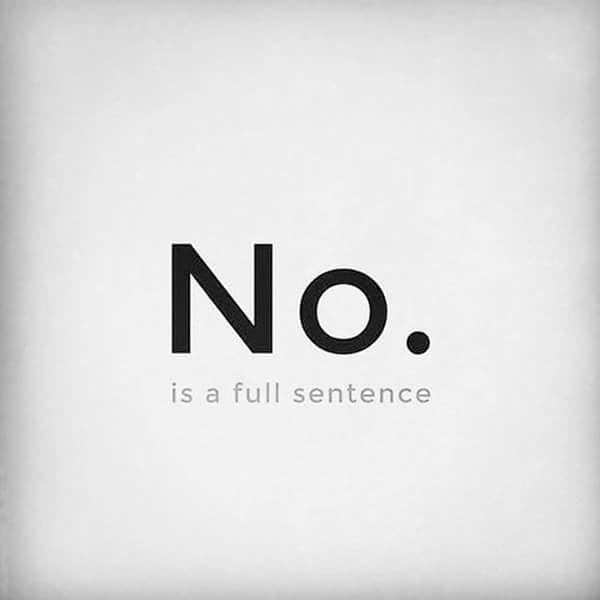

Yes—I am talking to you!
The “yes man, i’ll be there there, here’s some money, I can drive you, okay, okay, okay” kind of people pleaser. The ones who will do just about anything for anyone, except themselves. The ones with a smile on their face—and burning resentment within. Those who have justified their kindness because, well, they need you more than you need you. The people pleasers who have tried, and failed at changing their ways—the guilt, the guilt, the GUILT. If you’ve made it this far, I imagine you can relate. And i’m here to remind you of something so simple, yet profound. Ready? Hear me out….
No is a complete sentence.
No is a complete sentence.
No is a complete sentence.
My name is Meagan and I am a recovering people pleaser. I know of you, because for as long as I can remember, I was you. I was the go to person for favors. Oh, you want a ride? Sure. You want money, how much? You need a wingman, even though I work tomorrow, what time should I be ready? Boundaries, what are they? I wouldn’t know—I didn’t have any. And until the day I exploded in response to “can you drive me here?”, I hadn’t realized the impact people pleasing was having on my life. I wanted to change, but I had no idea how.
In attempt to break this pattern, I started to say no…followed by many reasons why I couldn’t say yes. The guilt would creep in soon after. It didn’t take long for me to change my mind, or to start offering ways I could make it up to them. I recall helping friends move, babysitting, and lending money just weeks after I had a brain tumour removed—I just couldn’t handle the guilt. I had enough, I was exhausted. With determination, I set out to find ways to make a lasting change. And with that, I learned some powerful lessons along the way. If you are ready to set some boundaries, put your needs first, and to become a recovering people pleaser as well, here are some strategies that may assist you in this process.
No is a complete sentence.
The next time you are asked to do something that you do not want to do, just say no. That’s it, that’s all—you don’t need to explain yourself. Maybe you’re tired, busy, or want to watch your favorite show. When you over explain, you may send a signal to the other person that you feel guilty. It may even give them permission to push your limits to see if you’ll change your mind. Learn how to be comfortable with the uncomfortable—in this case, just saying no. This is a practice that will serve you in many ways.
When you say yes to someone else, you say no to yourself.
This one was particularly challenging for me—one of my greatest values is to be of service. I was a helper, and believed that it was selfish to put myself first. There came a time when I looked around only to see that everyones to-do list was getting smaller—while mine, seemed to be growing. It had come to a point where saying yes to others meant I was saying no to myself. So, I learned how to pause, reflect on my needs, and answer someone at a later time (if at all). When we say yes too soon, we may regret it later. Remember: we are not helping someone we are doing it out of a place of guilt—that toxic feeling can do more harm than good.
Change is like a pendulum swing. It may take time to find a balance (and that’s okay).
Changing a habit, behaviour, or way of living can be challenging to say the least. And like the saying goes, “if you do what you’ve always done, you’ll get what you’ve always gotten”. When it’s time to change, it is important to know that it may take sometime to adjust. It is normal to become rigid with your new behaviour at first. When I was learning how to say no for the first time, I became hard, inflexible, and even came across as rude. I started declining anything and everything that came my way. Once I adapted, I became more flexible with my actions. My desire to help others returned, and it was easier to say no without feeling guilty. It was as though the pendulum had swung from one side, to the other, and back to the middle once again. And it is from that place that I live a happy, balanced life of serving others, while respecting myself along the way.
It took me years to recognize that people pleasing was a problem in my life. I had so much resentment and anger hidden behind my smile, that it interfered with new and old relationships. I thought they were taking advantage of me—when in reality, I put myself in the very position I complained about being in. And although I see old behaviours creeping in at times, I am able to take new actions, creating new results and more meaningful interactions. The time is now to put yourself first and to recognize that change is possible.
Just say no—it is a complete sentence after all.
Thank you for reading! Please feel free to like, comment or share!
Browse Front PageShare Your IdeaComments
Read Elephant’s Best Articles of the Week here.
Readers voted with your hearts, comments, views, and shares:
Click here to see which Writers & Issues Won.





I found this incredibly helpful and inspiring. I struggle so much with boundaries. The thing that really spoke to me was how you don’t need to write an explanation on why you are saying No. I always do this and it’s only because I feel guilty for saying no. Thank you for this helpful article.
I need to show this to my mom! Great article.